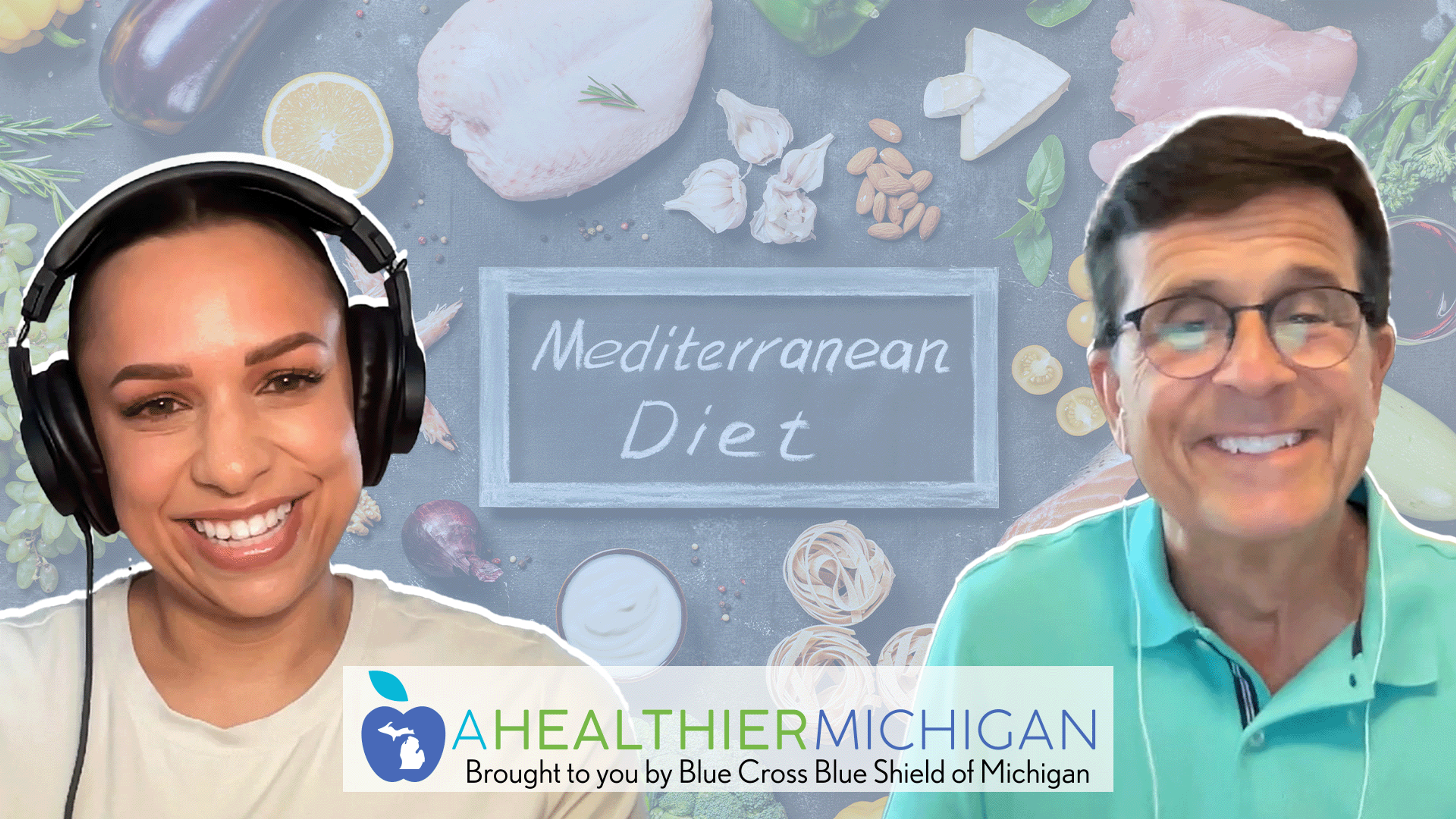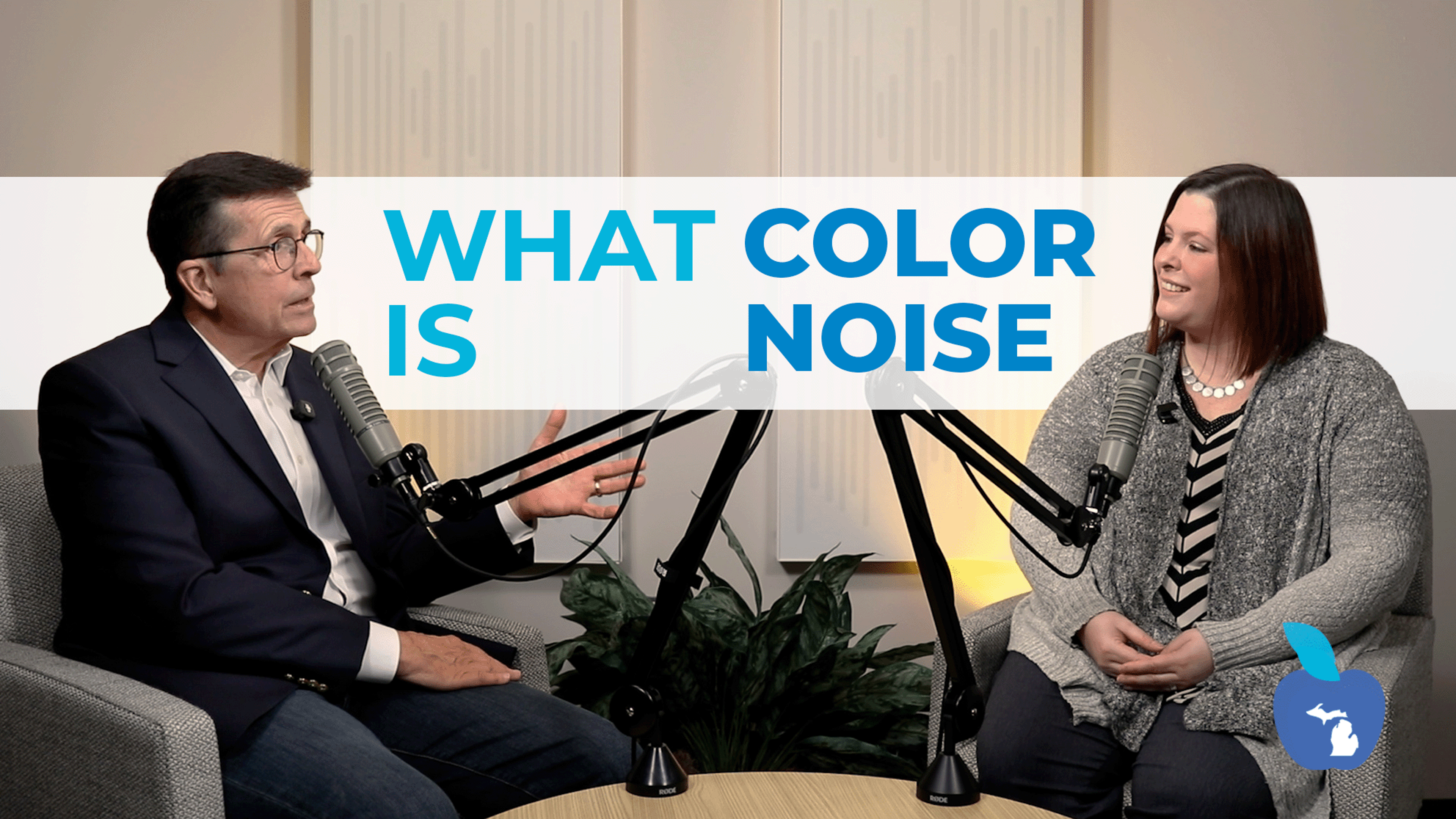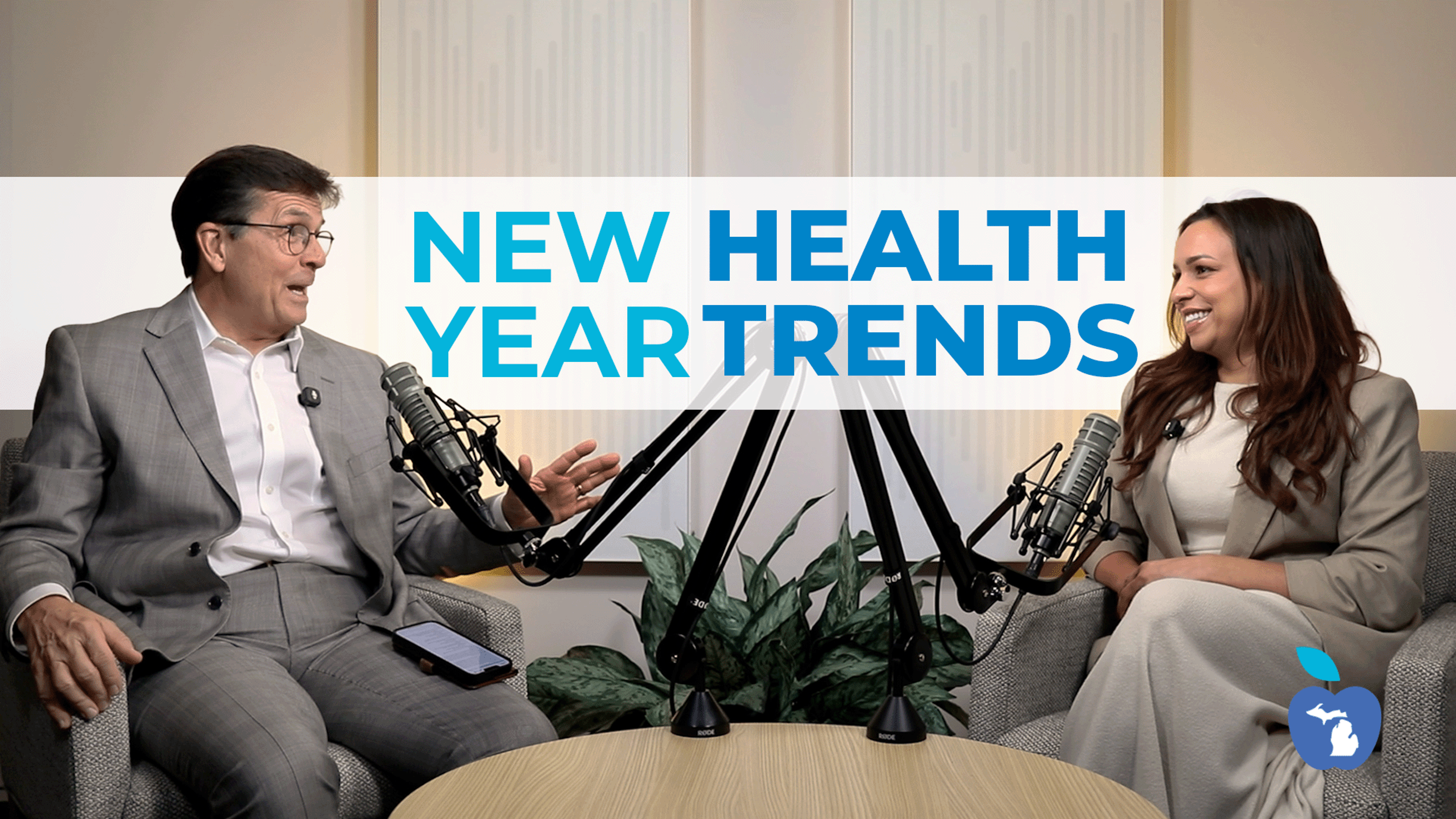Eating for Healing: An Anti-Inflammatory Diet
| 1 min read

00:00
00:00
About the Show
On this episode, Chuck Gaidica is joined by Registered Dietitian for Blue Cross Blue Shield of Michigan, Shanthi Appelö. Together, they explore ways to combat inflammation, why its bad long term and how small changes in your lifestyle can help fight it.
In this episode of A Healthier Michigan Podcast, we explore:
- What causes inflammation
- What some of the long term effects can be
- Diets that can reduce inflammation
- Other ways to fight inflammation
Transcript
Chuck Gaidica:
You're always hearing about what foods you should eat and what foods to avoid. Today, let's talk about some reasons why. This is A Healthier Michigan podcast, episode 182. And coming up, we'll explore the benefits of an anti-inflammatory diet.
Welcome to A Healthier Michigan podcast, it's a podcast that's dedicated to navigating how we can improve our health and well-being through small, healthy habits that we can start implementing right now. I'm your host, Chuck Gaidica. Every other week, we'll sit down with a certified expert and discuss topics that cover nutrition, fitness, and a lot more. And on this episode, we're diving into what chronic inflammation means. What is it, and how it contributes to chronic illness, and what foods you should eat and I should eat to stay away from it. With me today is Registered Dietitian for Blue Cross Blue Shield of Michigan, Shanthi Appelo. Hello, Shanthi.
Shanthi Appelo:
Hello.
Chuck Gaidica:
Good to have you back.
Shanthi Appelo:
Yeah, likewise.
Chuck Gaidica:
Yeah, thanks. So I guess when I thought about this episode, I kept thinking not too long ago if you would've mentioned the word inflammation, I would just think it's that red area around where I got a sliver. It's the stuff you can see, but define it for us. What is inflammation and why is it bad for us, especially long-term?
Shanthi Appelo:
Yeah, I hear it thrown out a lot too. I think everything kind of gets blamed for inflammation in terms of our health, which does have some reasons behind it. So I do think it's a good idea that we talk about what it is and the difference between short and long-term.
So, inflammation is our body's natural response to some injury or invader. You think bacteria, viruses, toxins, right? So in the short term, it is helpful because say you sprained your ankle, your body's going to rush these immune cells to the area to make sure it's healing properly. But chronic inflammation happens when that response kind of sticks around, even when we don't have a clear threat, our ankle isn't sprained anymore. But when it comes to food, maybe we have excess sugar in our diet, refined carbs, certain fats, environmental exposures, even smoke and pollution. This can make inflammation linger over time, which then can lead to problems in the long-term. So it's been linked to a lot of chronic conditions, so for example, heart disease. And it does that because it can damage our arteries. Type two diabetes because it can interfere with insulin. And then Alzheimer's, some cancers, and I could go on.
Chuck Gaidica:
Yeah, and what's interesting about this is what you said, and as you went through a list, and I know it's not the exhaustive list of how we get inflammation, I can't see that stuff happening in many cases. Right? I mean, unless I'm feeling off or I feel a palpitation or something that leads me to go to the doctor, a lot of this inflammation, I don't even know it's going on in a part of my body.
Shanthi Appelo:
Exactly. Maybe you don't feel right, but you can't see it. And that's because, and how researchers find inflammation in the body or how they measure it are by these markers. It's called C-reactive protein, so they're these tiny, tiny markers that we can't see, but when we have elevated levels of them, they are associated with this increased disease risk.
Chuck Gaidica:
And so those markers, are they particular to one kind of inflammation in a certain part of the body or all parts of the body could give you these markers?
Shanthi Appelo:
I think it's a lot more complex than I could probably describe, right? But we can definitely dive into how different foods can impact some of these inflammatory markers. So for example, we have something called cytokines in our body. So they're basically these proteins and they signal between our immune system and other tissues, and so they can promote inflammation. There's certain cytokines that do that. There's like TNF alpha, I'm trying to think back to my biochemistry days.
Chuck Gaidica:
That's all right, I won't know what you're telling me anyway, so I just know you're the expert, thanks.
Shanthi Appelo:
But anyways, these molecules are going to drive this inflammatory response. So then we have the opportunity through food to then help reduce some of these markers. So for example, omega-3 fatty acids, think your fatty fish, salmon, we talk about that all the time. But that's something that can help balance this anti-inflammatory molecules to help combat the cytokines.
Chuck Gaidica:
And I know we heard about that during the outbreak of COVID, the cytokine, it was kind of like an attack that could happen to your body. So, you're talking about some foods that are helpful. Are there other foods, not that protect us from a contagion like that perhaps, but from other things as well that could be giving us problems and inflammation?
Shanthi Appelo:
Yeah. So ultra-processed foods, we talk about peace all the time.
Chuck Gaidica:
Yeah, we do.
Shanthi Appelo:
Our traditional packaged foods where we can't really recognize what the food is anymore because it's gone through so many processes and so many ingredients have been added to them, like additives and things like that.
But anyways, there was this British medical journal study in 2023 and it tied these ultra-processed foods to elevated inflammatory biomarkers, so the ones that we were talking about. We also see that red and processed meats are culprits of this, so when they're charred or cured especially, they tend to be a problem for inflammation. And then anything that has really high glycemic index, so think your white breads and pastas, your baked goods, really sugary drinks, those are going to go in that category too. And then excess saturated fats, like if you're eating fried foods often or a lot of packaged foods, those can also contribute to this inflammation.
Chuck Gaidica:
You just took everything out of the 4th of July celebration that I went to, right? Can't have a hot dog, don't have a snow cone, forget the cookies that people bake. But I guess there's balance to this. You and I have talked about this a lot over time too, right? I mean, is it one cookie likely going to derail most people and send them into some kind of-
Shanthi Appelo:
Exactly.
Chuck Gaidica:
... massive inflammation, right?
Shanthi Appelo:
Yes. When over time we continue to feed our body with these foods and all throughout the day, and I think it can be easy to fall into that kind of pattern if you kind of fall into a convenience sequence in your life where you're like, oh, I'll just pick up some food. Oh, I'll just go through fast food, and then it kind of becomes more of a regular thing. So, we can definitely break the habits by introducing some better foods. And there are some other foods besides the omega-3 fatty acids that we can talk about that can help towards fighting inflammation.
Chuck Gaidica:
Yeah, so let's talk about them because I'm all for fighting against this idea, especially when it's like this invisible invader that I don't even know I may have. You know?
Shanthi Appelo:
Yeah, let's kick its butt. So spices like turmeric can reduce inflammation, and it's not just having a little bit of turmeric sprinkled on your oatmeal. I know that people have done that before, but it's quite a bit of turmeric. You have to have a couple tablespoons a day.
Chuck Gaidica:
Oh, wow.
Shanthi Appelo:
But something that does make it more potent is black pepper. So just adding a little bit of black pepper increases its effectiveness by 2,000%. So if you're ever going to have turmeric for anti-inflammation, make sure to do that.
We can also look to our leafy greens, our berries, anything that's really high in antioxidant content, because antioxidants can help neutralize these reactive oxygen species as we call them, that can contribute to inflammation in the body. So it kind of helps bind to these free radicals. If they're kind of floating around without a friend where they can do damage, then the antioxidants then bind to them and can stop them from doing continuous damage. So really colorful fruit and berries, blueberries, blackberries, those are great options. But also things like leafy greens, as I said. So have those salads this summer, load up the spinach salads, put a bunch of berries on them, and of course, some lean proteins and you've got a great kind of antioxidant meal.
Chuck Gaidica:
And I'm having deja vu again, if you will, because we've talked about the goodness of diets or lifestyle changes like you're talking about, right? Antioxidant rich foods, colorful foods. And yet, I don't know that we've ever directly pointed at anti-inflammatory as being an upside or benefit, which is fabulous because first of all, it's scary to think something could be happening I don't know about, but eating for goodness, all the good stuff is helping fight this thing all by itself. So why not lean yourself and your lifestyle in that direction, huh?
Shanthi Appelo:
Yeah, exactly. And one more thing that you can do, or one other mechanism, right? Because we talked about how the omega-3 fatty acids can help fight those cytokines, and then we have the antioxidants from the berries that can bind to the reactive oxygen species. But one last thing that you can do is help your gut microbiome as much as possible. So eating your fermented foods, yogurt, kimchi, having really high fiber foods like oats and flax seeds can then influence our gut flora. And then that can help with supporting our body's inflammation too.
Chuck Gaidica:
Man, we keep hearing more and more.
Shanthi Appelo:
Or anti-inflammation.
Chuck Gaidica:
Anti-inflammation. We keep hearing more and more from various studies, Shanthi, about brain health connected to gut health. I mean, there are all these connections that we keep discovering more about that just leads us to want to do better. Yeah.
Shanthi Appelo:
Absolutely, and when we think about diets, because it can sometimes be helpful to define these eating patterns into one thing, and it really all comes back to the Mediterranean diet, which is fruits, veggies, fish, olive oil for your fats, cutting out the saturated fat as much as possible, and then leaning a lot on those plant-based proteins.
Chuck Gaidica:
Well, Mediterranean diet could be equal sign. What's the brain diet? Is the [inaudible 00:10:05].
Shanthi Appelo:
The mind diet.
Chuck Gaidica:
The mind diet, right. Came out of Cleveland Clinic, I think in part. So, some of those things just make such perfect sense and yet, when you get to the 4th of July or the birthday party, nobody is saying to be a killjoy and not enjoy yourself. But it's just-
Shanthi Appelo:
Exactly.
Chuck Gaidica:
Yeah, most of the time, if you're leaning that way, you're just helping yourself and your family out.
Shanthi Appelo:
Yeah, and if you think about your 4th of July spread, maybe you had some burgers and wings and things like that, but there's such a great opportunity to make something festive happen outside of that or spice up your burger. Swap your burger meat, maybe you make a salmon burger instead to get those omega-3s. Maybe you load it up with as many vegetables as possible. Maybe you make a little tzatziki dip that has that Greek yogurt, or make a really colorful pasta salad that has all the goodness in it, all the colors from the cherry tomatoes to bell peppers to black olives and all of those kind of things.
Chuck Gaidica:
I don't know if you noticed, I look a lot less inflamed right now because I just had hummus and some salmon for lunch. So, I'm thinking-
Shanthi Appelo:
Oh, look at you. I could tell.
Chuck Gaidica:
Yeah, I don't know. If you ask my wife if I'm smarter, she probably wouldn't stick up for me, but yeah, okay. So when it comes to anything else that we can do to influence this inflammatory response some of us have, what about exercise?
Shanthi Appelo:
Yeah, there's definitely a lot of benefits to exercise. Just 30 minutes of moderate activity. So, think your brisk walk where you're having a little bit of trouble talking but you can't sing. Biking, dancing, whatever you like to do, can actually reduce these inflammatory markers. So, another way that it can do that is not only stimulating these anti-inflammatory compounds in the body, but it can also support immune function by getting that exercise. But think outside the box, do other things, right? Think about your yard work and your housework and walking meetings as exercise too. You can squeeze that in in so many different ways.
Chuck Gaidica:
And what you're saying, this idea of non-essential exercise, a lot of us forget, especially those who may still be working from home and not in an office or maybe still in an office if you're allowed to walk around and take a call. There are so many ways to just blend this in through the day. My watch now tells me to stand, "It's time to stand," and you're tempted to hit dismiss, got it, stop it. But at the same time, it really has been instructive for me to learn those signals where I can bring together a little meeting with a grandkid or whatever it is on a walking trip or even a bike ride with somebody. You know? Yeah.
Shanthi Appelo:
Yeah, yeah, and not to think of our goals as too grand, because 10 minutes a day is way better than zero minutes.
Chuck Gaidica:
Oh, yeah, yeah.
Shanthi Appelo:
It really is. I did just somehow get talked into joining a soccer league when I've never played soccer in my life.
Chuck Gaidica:
And?
Shanthi Appelo:
So, and I've scored a goal, but there was no goalie there. No, but I think all that to say, it's not anything that I've ever done in my life and I was a little nervous to do it, but I think stepping outside of your comfort zone can also be really fun. Maybe you explore a sport that your friends have been talking about. I've heard all the hot things about pickleball, I've thought about trying that. So just maybe there's something fun that you can do to get in a little bit of exercise that you didn't expect that you could do.
Chuck Gaidica:
There is something that is great fun about pickleball. At first I just thought, I used to play racketball back in the day and a little bit of tennis, and then I kept thinking, I don't know. And then when I heard that my kids were playing pickleball, I thought, well, this isn't just like old people stuff, this is for everybody. And I get out there-
Shanthi Appelo:
It's been rebranded.
Chuck Gaidica:
Well, it really should because I was on a court, multiple courts the other day, and from eight years old, somebody brought their son, to 80 years old, people were playing pickleball. And I thought, it's really got something going for it because you don't necessarily need to move as much as you think to stay in the game. It was just delightful to get into something, and I'm not great at it. I just enjoy going out there and doing it.
Shanthi Appelo:
Yeah, and it seems like something you can build on and get better at. And I think it kind of keeps your mind active too, when you're kind of paying attention to everything that's going on. And it seems like because it's becoming more popular, there's so many opportunities to do it in more communities, and it seems like you can grow quite a social network that way too.
Chuck Gaidica:
I just want to double back for a minute on something because you've just shared with us that you're learning something new, which all by itself I think is a very helpful proposition, but talk about, and maybe help us, coach us a little bit on the idea of forming new habits. And maybe they don't have be the big goals, like you say, but give us a pitch on that because you can't start something new if you don't begin it.
Shanthi Appelo:
Right. I think something you can do is stack new habits into current ones. Right? So walking while you're on the phone, maybe you have a few people that you always talk to, taking a walk while you're doing that. Trying to make something else active that you're already doing, like you said, taking a meeting or seeing if one of your coworkers are willing to take a walking meeting with you. If you're already working, think about standing instead of sitting. Right? So things that you're already doing, thinking a ways to make them more active is always a good idea.
Chuck Gaidica:
Yeah. This is a bit personal, but you can just slap me digitally if you don't like it. Have you employed any of these things in your life outside of the dietary part, which I would assume as a nutritionist and dietitian that's already a given? Anything else outside of the new exercise that you're saying, this is a good way for me to get healthier now?
Shanthi Appelo:
Yeah, so I mentioned the soccer, but another thing that I started doing a year and a half ago was golfing. And that's something I always perceived as being very boring, but now it's all I want to do.
Chuck Gaidica:
Is it? Good for you.
Shanthi Appelo:
Yeah. It's one of those things where I feel like I can stack my social life into something active. Right? So people that I want to see, hey, we can walk the course and we'll all get 10,000 steps in today. Right? And just, I don't know, I think I'm just looking at ways to be more active socially, and that's been working really well for me, whether that's taking a walk, kicking the soccer ball around with my husband, or trying a new park with my dogs.
Chuck Gaidica:
Well, the whole golf thing, that could be a whole new podcast episode. I've played six times in my life, I love every minute of it. Shanthi, I am so bad, I'm-
Shanthi Appelo:
Same.
Chuck Gaidica:
... embarrassed to be out there. Right? And I just keep thinking, oh, if I just slice the ball and everybody thinks it's a joke, that'll be fine, but it's really me. So I've really wrestled with this and maybe you're encouragement here is good for me too. I've wrestled with, how long do I want to take in my life and learn something new and be frustrated? And yet there's still the fun factor, like we're talking about with pickleball. So, I may give it a try.
Shanthi Appelo:
Yeah, I think you should. Yeah. Go to the driving range, see how you hit them. It's the little dopamine hit of getting a good swing is great.
Chuck Gaidica:
So any parting thoughts for all of us about this episode and inflammation?
Shanthi Appelo:
Yeah, I think this chronic inflammation, it's something that a lot of us carry with us without us knowing, and we don't see it like you said, but there really are these just small, consistent changes that we can make. Start with one meal, start with 10 minutes of exercise a day, and build from there, we don't have to overhaul anything. And I think what you said rings so true, we can still enjoy ourselves at these 4th of July parties. We can still enjoy the ice cream, the burgers, and all the foods that we really love, but just what we're doing most of the time is what matters most. So, just make sure you're snacking on healthy things for the most part, and making sure you're getting your fruits and vegetables in every day.
Chuck Gaidica:
Good stuff. Well, Shanthi, it's great to see you. Thanks again.
Shanthi Appelo:
Likewise.
Chuck Gaidica:
All right, be well, with us today is Registered Dietitian for Blue Cross Blue Shield of Michigan, Shanthi Appelo, and we're glad you've been here. Thanks for listening to A Healthier Michigan podcast, is brought to you by Blue Cross Blue Shield of Michigan. If you like the show and you want to know more, you can go online to ahealthiermichigan.org/podcast, or you can leave us a review or rating on Apple Podcast or Spotify. You can follow us on multiple places, Facebook, Instagram, or Twitter. And you can get new episodes, old ones too, on your smartphone or tablet. And be sure to hit the subscribe button on Apple Podcasts, Spotify, or your favorite podcast app. I'm Chuck Gaidica, stay well.





